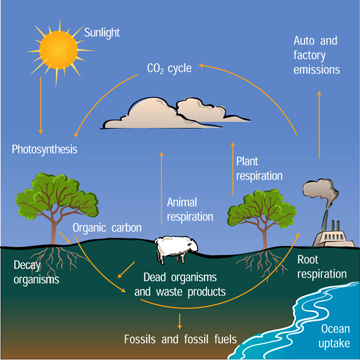Biodiversity & Environment
Land Sink & Emissions
- 04 Sep 2021
- 5 min read
Why in News
Despite caution from scientists, policymakers and corporations still assume that natural carbon sinks like land and oceans will mop up their fossil fuel emissions.
Key Points
- Land Sink:
- Land is a critical component of the climate system, actively engaged in the flows of carbon, nitrogen, water, and oxygen - essential building blocks for life.
- Greenhouse Gases (GHGs such as carbon dioxide) follow a natural cycle - they are constantly released into the atmosphere and are removed from it via natural ‘sinks’ such as the land and oceans.
- Plants and healthy ecosystems have an unparalleled capacity to absorb carbon through photosynthesis and store it in living biomass.
- About 56% of the carbon dioxide (CO2) emitted by humans is absorbed by the oceans and land.
- About 30% by land and the rest by oceans.
- Recognition of Role of Land:
- The role of land (forests and agricultural land) as a mitigation pathway to reduce CO2 emissions was recognised by the United Nations Framework Convention on Climate Change (UNFCCC) in 1992.
- The Kyoto Protocol in 1997 endorsed the notion that not only should governments employ policies to enhance the land carbon sink capacities of their territories but also that such mitigation could be set against requirements for reductions in emissions from fossil fuel consumption.
- Related Data:
- Land use accounted for 13% of anthropogenic CO2 emissions during 2007-2016, according to a report by The Intergovernmental Panel on Climate Change (IPCC) in 2019.
- But it also provided a net sink of around 11.2 gigatonnes of carbon dioxide per year, equivalent to 29% of the total CO2 emissions in the same period.
- This means, 29-30% human-driven CO2 emissions have been soaked up by the world’s land sinks during the past three decades.
- Land use accounted for 13% of anthropogenic CO2 emissions during 2007-2016, according to a report by The Intergovernmental Panel on Climate Change (IPCC) in 2019.
- Concerns:
- Rising Heat Levels:
- Increased heat levels are adding to the moisture stress in forests and leading to widespread burning.
- So, on the one hand, forests are being cut for different economic activities, reducing their role as sinks for the CO2 released from fossil fuel burning.
- On the other hand, as temperatures increase, the forests will shrink further.
- Anthropogenic and Natural Factors:
- Human-induced factors such as deforestation and natural factors such as climate variability in sunshine, temperature and rainfall can cause a variation in the strength of the land carbon sink.
- Rising CO2 Concentration:
- Climate Change 2021 Report: IPCC states that CO2 emissions are the highest in at least two million years. Humans have emitted 2,400 billion tonnes of CO2 since the late 1800s.
- Rising Heat Levels:
- Suggestions:
- Growing Trees:
- The world is not on track to reduce GHG emissions at the scale needed to avert a temperature rise of 1.5°C over pre-industrial levels.
- The solution, then, is to find ways in which emissions can be removed from the atmosphere and growing trees becomes part of this package.
- Get off Fossil Fuels:
- There is a need to use land especially in this interim of moving from fossil fuels to Renewables; but in the end fossil fuels must be gotten rid of.
- Artificial Carbon Sequestration:
- The artificial carbon trapping technologies efficiently capture carbon in large amounts, convert it and also store it for thousands of years.
- The technique is based on passing air through a stack of charged electrochemical plates.
- The technology aims to make coal a viable, technical, environmental and economic case for the future.
- The artificial carbon trapping technologies efficiently capture carbon in large amounts, convert it and also store it for thousands of years.
- Growing Trees:
- Related Initiatives:
- Bonn Challenge:
- Bonn Challenge is a global effort to bring 150 million hectares of the world’s deforested and degraded land into restoration by 2020, and 350 million hectares by 2030.
- UN Decade on Ecosystem Restoration:
- In March 2019, the United Nation General Assembly declared 2021-2030 as the UN Decade on Ecosystem Restoration to “prevent, halt and reverse the degradation of ecosystems worldwide”.
- LEAF Coalition:
- It is an effort led by the US, the UK and Norway to mobilise at least USD 1 billion for financing countries committed to protecting their tropical forests.
- Bonn Challenge:







